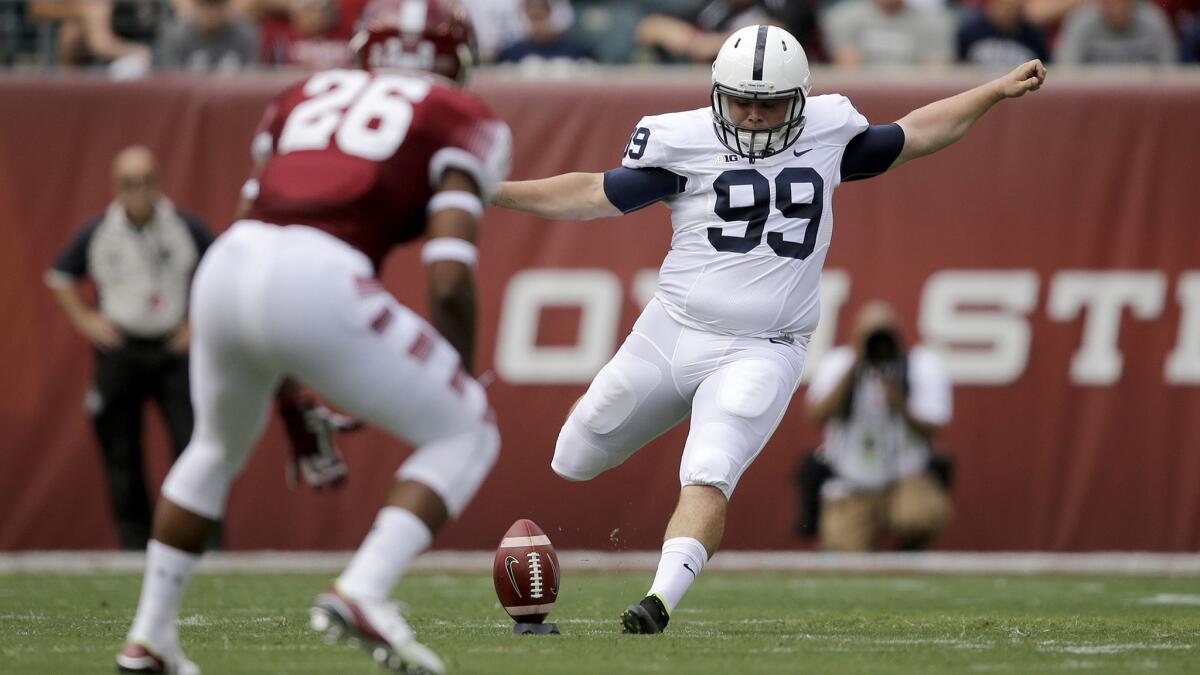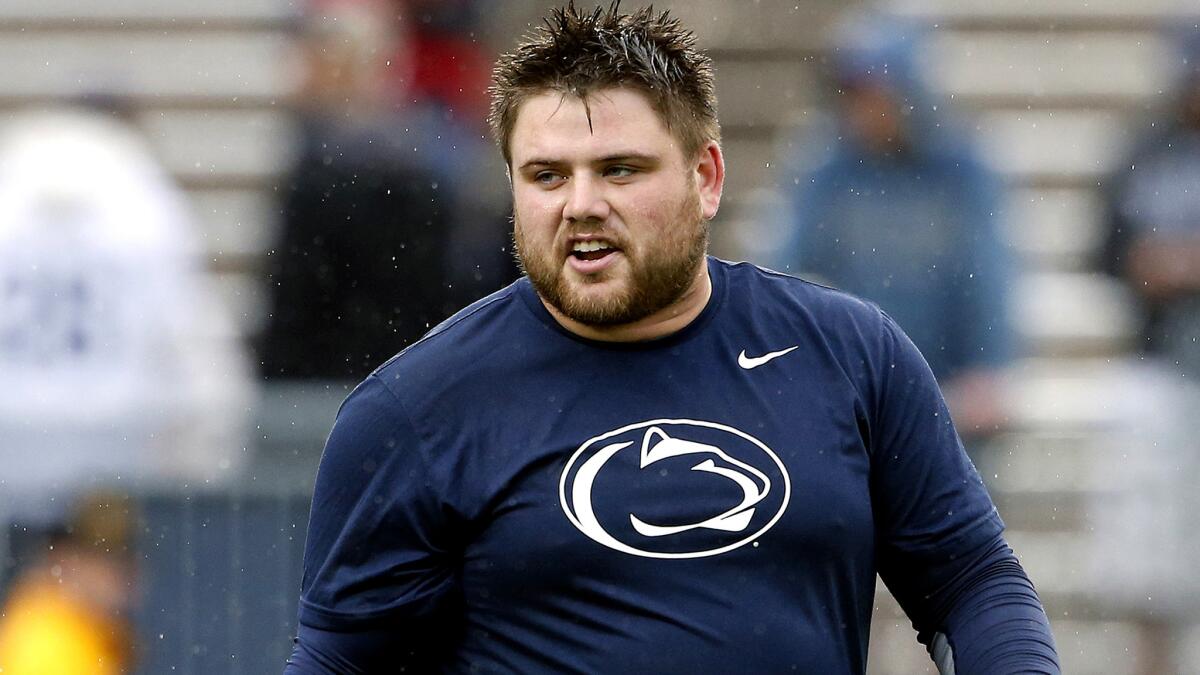Column: Going public about eating disorder lifted a great weight for Penn State kicker Joey Julius

- Share via
Joey Julius called his mother. It was 2 a.m. on a day after a Penn State football victory, and his feelings of triumph were being gnawed by doubt.
He was that big guy everybody loved but nobody really knew. He was a video sensation, a giant kicker who made crushing tackles. But nobody understood his real fight.
“Mom, I feel like a fraud,” he said. “I feel like I’m not being true to myself.”
Joey Julius then hung up the phone, logged onto Facebook, and began to type.
“After a long consideration of not only myself, my family and my team, I have decided to go public about my absence from the team during spring ball of 2016 and thru out this summer,’’ he wrote. “I was admitted into the McCallum place on May 9th for eating disorders.”
There it was. It was out. The 5-foot-10, 271-pound athletic freak was acknowledging something very vulnerable, very human. He was admitting he had a problem that most people associate with young women, not men who wear helmets.
“Due to my increase in not only weight but also depression and anxiety, my team physicians started to notice not only a change in my overall happiness but also my performance as a normal human being,” he wrote. “I learned that for the last 11 years of my life I have suffered through a disorder known as binge eating disorder.”
There it was, a secret he could have held for the rest of his life, willingly told at the tender age of 21, on a national stage for the entire unforgiving sports world to witness.
Binge eating disorder is suffered by millions, reported by few, and treated so infrequently in men that Julius estimated he was one of only two males in his 50-person treatment unit.
This was the reason that, as a child, when nobody was looking, Julius would eat so much he would wind up laying on the kitchen floor in pain.
This was the reason his body issues were so acute that he left his high school prom early because he didn’t want anyone to see him dancing without a suit coat.
This time last year, the man who will kick off for Penn State against USC in Monday’s Rose Bowl could barely take the field. He would look in the mirror and call himself “fat” and “disgusting.” He was barely functional. He had thoughts of suicide.
“I used to fear that with him all the time,” his mother Patty said. “A very legitimate fear.”
By last spring, Julius was staying up late while literally eating himself toward death. He would munch on salads in front of teammates, then sneak cheesesteaks and Chinese food back to his room for all-night binges that left him unable to sleep yet barely able to move.
His physical exams revealed disturbing blood counts. His play and behavior became more erratic. During one meeting with the team’s trainers, he wept and begged for help. The new leaders of the Penn State program responded as leaders do, quietly sending Julius to a treatment center where he lived for nearly three months, then welcoming him back to a team he rejoined with newfound strength and confidence.
I had no idea it would touch so many people. I didn’t know there were many people who needed help.
— Joey Julius on going public about his eating disorder

But, he thought, what good would this change be if he couldn’t share it with others? What good would he be if he couldn’t help others? Thus, in the early morning hours of Oct. 3, without the knowledge of coaches or teammates or even his mother who was just on the phone, he pushed the “Enter” key on a Facebook post that ended with a promise.
“If anyone and I mean anyone guy or girl is struggling with the same or anything similar please message me as I will be in immediate contact to help in any way I can to provide information or insight on my struggles and I would love to help,” he wrote. “Praise be to God and thank him for my ability to be honest about this.”
There will be plenty of tough young men roaming around a Pasadena football field Monday, perhaps none stronger than that giant kicker who accomplished far more with his keyboard than he ever did with his leg.
His kickoffs will momentarily fly, but, for nearly three months, that Facebook post has soared.
“I had no idea it would touch so many people,” Julius said Friday, speaking in a quiet corner of a crowded Rose Bowl media-day room at a downtown Los Angeles hotel. “I didn’t know it would go nationwide. I didn’t know there were many people who needed help. I just knew with the platform I had, I could reach a lot of people, and it was wrong to keep it a secret.”
Julius said he fell into a deep and restful sleep after sending the post — a rarity before his treatment — then awoke to a phone filled with messages.
“I’ve heard from parents who said their kids were struggling, and kids who couldn’t tell their parents about their struggles,” he said. “The Facebook post was very scary. It took me a while to do it, but my path to recovery has to do with me being honest about who I am, and this is who I am.’’
Before that post, the college football world looked at him as someone far different.
He was that odd number, 99, a kicker in a nose guard’s body, a guy whose two best hits this season weren’t with his leg, but his shoulder pads. Just check out the YouTube videos.
On a kickoff against Kent State, he knocked returner Kavious Price four yards backward. On a kickoff against Michigan, sprinting in from the blind side, he crushed returner Jourdan Lewis.
“Never been hit by a kicker,” said an amazed Lewis. “Never been caught by a kicker, actually”
Julius is such a physical presence that opponents began sending blockers to wrestle him to the ground, leading to penalties and chaos. Yet, watching the aftermath from the stands, his mother saw only beauty.
“For the first time, he was smiling on the sidelines, happy with his teammates, jumping up and down,” Patty said in a phone interview. “Watching him this season, it’s obvious how much his treatment has changed him.”
Now the only fear is the powerful Julius bruising someone during his leaping celebrations. The big kicker dances like a happy kid again. A weight truly has been lifted.
“What has happened has helped him grow as a person, helped the team embrace him more, you definitely see someone who is different,” said Charles Huff, Penn State’s special teams coordinator. “His story has really brought our team together.”
Not that there still aren’t temptations. Goodness, part of the pregame Rose Bowl revelry includes an event where the players are rewarded for eating giant slabs of meat. But Julius said he knows the temptations now, and is handling them.
“I still struggle with it, I’m going to struggle with it for the rest of my life,” he said. “I still sometimes have the depression, the anxieties, but now people can tell, I’m not hiding anything, it’s so much easier.”
After the media session ended Friday morning, Julius walked past a table filled with rich carbonated sodas. He reached for one. He stopped. He pulled back. He kept walking, and quickly disappeared into a group of blue-shirted teammates. Together they headed down the escalator, out the door, and outside under gray skies slowly filling with light.
Get more of Bill Plaschke’s work and follow him on Twitter @BillPlaschke
More to Read
Go beyond the scoreboard
Get the latest on L.A.'s teams in the daily Sports Report newsletter.
You may occasionally receive promotional content from the Los Angeles Times.











